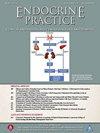Use of Natural Language Processing to Extract and Classify Papillary Thyroid Cancer Features From Surgical Pathology Reports
IF 3.7
3区 医学
Q2 ENDOCRINOLOGY & METABOLISM
引用次数: 0
Abstract
Background
We aim to use Natural Language Processing to automate the extraction and classification of thyroid cancer risk factors from pathology reports.
Methods
We analyzed 1410 surgical pathology reports from adult papillary thyroid cancer patients from 2010 to 2019. Structured and nonstructured reports were used to create a consensus-based ground truth dictionary and categorized them into modified recurrence risk levels. Nonstructured reports were narrative, while structured reports followed standardized formats. We developed ThyroPath, a rule-based Natural Language Processing pipeline, to extract and classify thyroid cancer features into risk categories. Training involved 225 reports (150 structured, 75 unstructured), with testing on 170 reports (120 structured, 50 unstructured) for evaluation. The pipeline's performance was assessed using both strict and lenient criteria for accuracy, precision, recall, and F1-score; a metric that combines precision and recall evaluation.
Results
In extraction tasks, ThyroPath achieved overall strict F-1 scores of 93% for structured reports and 90% for unstructured reports, covering 18 thyroid cancer pathology features. In classification tasks, ThyroPath-extracted information demonstrated an overall accuracy of 93% in categorizing reports based on their corresponding guideline-based risk of recurrence: 76.9% for high-risk, 86.8% for intermediate risk, and 100% for both low and very low-risk cases. However, ThyroPath achieved 100% accuracy across all risk categories with human extracted pathology information.
Conclusions
ThyroPath shows promise in automating the extraction and risk recurrence classification of thyroid pathology reports at large scale. It offers a solution to laborious manual reviews and advancing virtual registries. However, it requires further validation before implementation.
利用自然语言处理技术从外科病理报告中提取甲状腺乳头状癌特征并进行分类。
背景:我们的目标是使用自然语言处理(NLP)从病理报告中自动提取甲状腺癌风险因素并对其进行分类:我们分析了 2010 年至 2019 年成人甲状腺乳头状癌患者的 1,410 份手术病理报告。我们使用结构化和非结构化报告创建了基于共识的基本真实字典,并将其分为修改后的复发风险等级。非结构化报告是叙述性的,而结构化报告则遵循标准化格式。我们开发了基于规则的 NLP 管道 ThyroPath,用于提取甲状腺癌特征并将其归入风险类别。培训涉及 225 份报告(150 份结构化报告,75 份非结构化报告),测试评估涉及 170 份报告(120 份结构化报告,50 份非结构化报告)。在准确度、精确度、召回率和 F1 分数(精确度和召回率的综合评价指标)方面,我们采用了严格和宽松的标准来评估管道的性能:在提取任务中,ThyroPath 在结构化报告和非结构化报告中分别取得了 93% 和 90% 的严格 F-1 分数,涵盖了 18 个甲状腺癌病理特征。在分类任务中,ThyroPath 提取的信息根据相应的基于指南的复发风险对报告进行分类的总体准确率为 93%:高风险为 76.9%,中度风险为 86.8%,低风险和极低风险病例均为 100%。不过,ThyroPath 在所有风险类别中的准确率都达到了 100%,而人工提取的病理信息的准确率也达到了 100%:ThyroPath在大规模甲状腺病理报告的自动提取和风险复发分类方面显示出了前景。它为费力的人工审核和虚拟登记提供了解决方案。不过,在实施前还需要进一步验证。
本文章由计算机程序翻译,如有差异,请以英文原文为准。
求助全文
约1分钟内获得全文
求助全文
来源期刊

Endocrine Practice
ENDOCRINOLOGY & METABOLISM-
CiteScore
7.60
自引率
2.40%
发文量
546
审稿时长
41 days
期刊介绍:
Endocrine Practice (ISSN: 1530-891X), a peer-reviewed journal published twelve times a year, is the official journal of the American Association of Clinical Endocrinologists (AACE). The primary mission of Endocrine Practice is to enhance the health care of patients with endocrine diseases through continuing education of practicing endocrinologists.
 求助内容:
求助内容: 应助结果提醒方式:
应助结果提醒方式:


